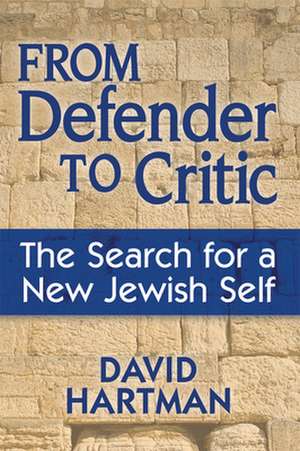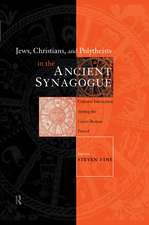From Defender to Critic
Autor David Hartmanen Limba Engleză Paperback
| Toate formatele și edițiile | Preț | Express |
|---|---|---|
| Paperback (1) | 109.86 lei 3-5 săpt. | |
| – | 109.86 lei 3-5 săpt. | |
| Hardback (1) | 206.15 lei 3-5 săpt. | |
| Jewish Lights Publishing – 29 feb 2012 | 206.15 lei 3-5 săpt. |
Preț: 109.86 lei
Nou
21.02€ • 21.87$ • 17.36£
Carte disponibilă
Livrare economică 25 martie-08 aprilie
Specificații
ISBN-10: 1683360699
Pagini: 324
Dimensiuni: 152 x 229 x 17 mm
Greutate: 0.44 kg
Notă biografică
A world-renowned philosopher and social activist, Dr. David Hartman (z"l) was the founder and president emeritus of the Shalom Hartman Institute in Jerusalem. Named after his late father, the Institute is dedicated to developing a new understanding of classical Judaism that provides moral and spiritual direction for Judaism's confrontation with modernity.
Formerly professor emeritus at Hebrew University in Jerusalem, he received his rabbinic ordination from Yeshiva University's theological seminary in New York City. He is the author of many award-winning books, including From Defender to Critic: The Search for a New Jewish Self; The God Who Hates Lies: Confronting and Rethinking Jewish Tradition; A Heart of Many Rooms: Celebrating the Many Voices within Judaism, finalist for the National Jewish Book Award and a Publishers Weekly "Best Book of the Year"; and Love and Terror in the God Encounter: The Theological Legacy of Rabbi Joseph B. Soloveitchik (all Jewish Lights). His classic works A Living Covenant: The Innovative Spirit in Traditional Judaism (Jewish Lights) and Maimonides: Torah and Philosophic Quest both were winners of the National Jewish Book Award.
Cuprins
Introduction: From Loving Defender to Loving Critic: An Intellectual Autobiography
Part I: The Spirituality of Halakha: Early Essays
1. The Joy of Torah
2. The Body as a Spiritual Teacher: Learning to Accept Interdependency
3. Democratizing the Spiritual: The Risks and Rewards of Halakha
4. Embracing Covenantal History: Compassion, Responsibility, and the Spirituality of the Everyday
5. Creating a Shared Spiritual Language: The Urgency of Community and the Halakhic Roots of Pluralism
6. Conquering Modern Idolatry: Building Communities of Meaning around Shared Aspirations
7. Learning to Hope: A Halakhic Approach to History and Redemption
Part II: Abraham's Argument: Reclaiming Judaism's Moral Tradition
8. Abraham's Argument: Empowerment, Defeat, and the Religious Personality
9. A Covenant of Empowerment: Divine Withdrawal and Human Responsibility
10. Mishpachtology: Judaism as a Family System
11. Custom and Innovation: Stepping Beyond the Parameters of the Past
12. My Daughter Is Not My Mother: Rethinking the Role of Women in Traditional Judaism
13. Hillel's Decision: Subjective Piety as a Religious Value
14. Halakha as Relationship: Toward a God-Centered Consciousness
15. Among Abraham's Children: The Confrontation of the Particular with the Universal
Notes
Bibliography
Index













